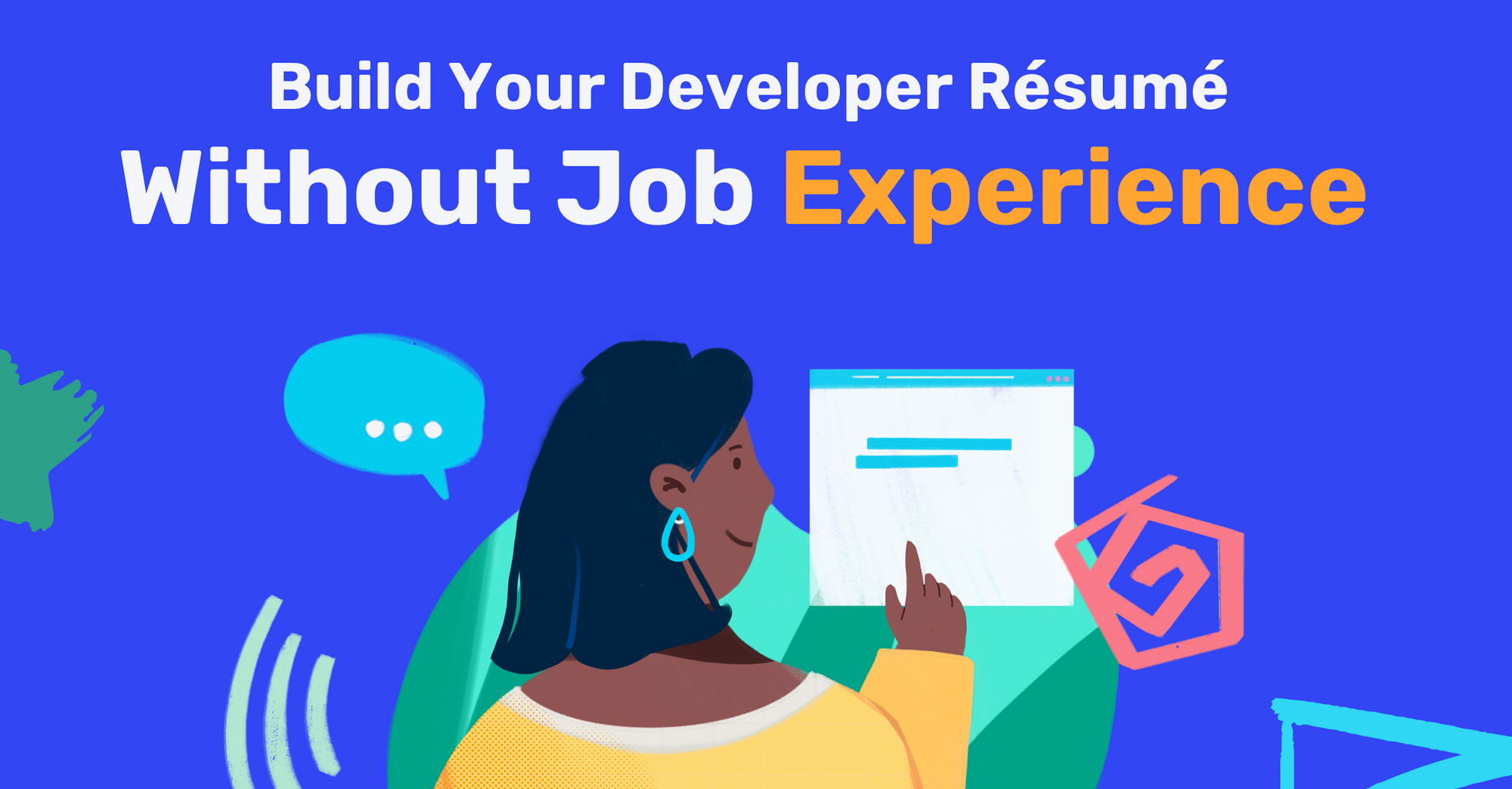I have observed a fascinating phenomenon amongst folks applying for their first developer jobs.
The behavior seems consistent across college graduates, Bootcampers, and self-taught folks. When asking for a résumé review, they almost always get the answer "build more projects".
This is great advice, but you can do more to improve your odds. Better yet, you can do a few important things in parallel.
Here are some of the job-hunting hacks that really helped me, as a self-taught developer, land interviews throughout my career.
Build Your Personal Brand
Difficulty: 3/5
I like to think of us developers as a business of one. At the start of our career, we are a tiny startup that no one has ever heard of. We don't yet have customers (or experiences), and people are reluctant to give us a chance.
However, just like the modern business world, it is getting increasingly harder to be successful and unknown.
Let's look at the example of Shopify, which seems to be more aware of the importance of personal brand within recent years. Their CEO, Tobi Lutke, has become more public recently, hosting AMAs as well as hanging out in social channels like Clubhouse.
As another example, Quincy, the founding teacher behind freeCodeCamp, is also an active personality on Twitter.
Just as founders are responsible for shaping the narrative of their respective companies, we as individual developers need to be aware of our own brand with our tiny business of one.
How can you build your brand?
I have seen a 13 year old with 30k followers on Twitter building 10 projects within a year. We can all look at him in awe and stress about the importance of building your personal brand.
But finding your brand is a discovery process, and here are the things I have seen people successfully do:
- Build projects publicly and tweet about the journey (example)
- Interact and network with other developers on tech Twitter
- Create a YouTube channel and share what you have learned (channel example)
- Live stream yourself programming on Twitch
So many people have made valuable connections and have been offered job positions just by being active on social media. If you are just getting started in your tech career, having your personal brand can help tremendously.
You can use a link-in-bio service like Linktree to tie all your socials together. For developers, using your Twitter or blog is also common. Share it on social media, introduce yourself to recruiters, or link it when asking for referrals.
Having a personal brand is a strong indication of social proof, which leads people to trust you more, resulting in more opportunities.
Share Your Knowledge in a Developer Community
Difficulty: 1/5
Another way to network within the developer community is to contribute meaningfully as an active member.
This is similar to our first point of building your personal brand. But we are no longer solely trying to promote ourselves. Instead, we are genuinely producing good content to educate and help our peers.
The advantage is that this is easier to get started. You don't need to go through the hassle of building your audience as most of the sites will lend you theirs. It is the easiest way to get your voice heard.
How to start writing
Here are some developer-focused publications that I have found:
- dev.to: a blogging platform like Medium, but focused on developers
- daily.dev: a platform that curates other dev news
- freeCodeCamp: my favorite. numero uno.
- hackernoon: another big publication besides fCC
- hashnode: make your own dev blog. You need to build your audience, however.
- slip.so: build a programming course. You need to build own audience, however.
Writing makes your résumé stronger as you can dedicate a section of your résumé to your contributions. It can also kickstart your brand as you are positioning yourself as a domain expert.
Lastly, and perhaps the most important thing, is that it reinforces your own knowledge. By teaching others, you summarize the core concepts in your own words and test your own understanding.
How to start contributing to forums
Contributing and helping other developers on forums like Stack Overflow, Reddit, or the freeCodeCamp forum does not directly make your résumé better.
But, as a developer, you will most likely be working with a small team of other engineers, product managers, and designers. By helping others, you propel your team's success. You can gain valuable communication, debugging, and leadership skills that will be useful throughout your career.
Connect Directly with Recruiters
Difficulty: 1.5/5

This is one of the most underrated hacks. Recruiters are very, very busy people. Way busier than we are as developers.
They are working between 3-40 open positions at any given time, and have to screen thousands of résumés per position. If yours does not stand out, you have to think of other ways to get through the door.
How to connect with recruiters
You can skip the online application hell through cold-emailing, LinkedIn connections, or meeting companies directly to hand-deliver your résumé.
How to send a cold email to a recruiter
For cold-emailing, start by finding out the recruiter's email at x company. There are tutorials for this so I will skip through that.
You will then want to have a short-and-sweet email detailing the positions you want to be considered for, and what makes you stand out (hello personal brand).
Then, politely ask if they are interested in receiving your résumé. Be confident in your email. If they reply, then you know you have a good chance.
How to connect with a recruiter through LinkedIn
For LinkedIn, just send a connection request to recruiters working for x company. Send a short intro "I'm looking for frontend positions" on why you want to connect with them.
However, I have found the third method to be more direct, as you get to connect with recruiters in person.
How to connect with recruiters at career fairs
The third method is to attend career fairs. This is by far my favorite method, and why I started making equia.io.
We organize career fairs where you can deliver your résumé directly to the recruiter, so you can skip through the online application hell. It is 100% free for people from all over the world.
The seats are limited as I have limited bandwidth with my full-time job. However, I encourage you to register so you receive emails for the next available events.
I will talk about connecting with recruiters at in-person events more in the final section.
Contribute to Open Source Projects
Difficulty: 4.5/5
This can be a hard one to get into as a beginner. But it is rewarding, as you develop a sense of community and belonging. Some of the best developers are working on open-source projects that we use every day (like freeCodeCamp).
How to get involved with open source
You can start by finding interesting open source projects on GitHub or other dev communities. You should then look at the open issues, make sure to read the contributor's guideline, and make your first contribution.
Here's a helpful guide that details how you can start contributing.
I am only going to recommend some of the bigger projects here. We all have different interests, so I encourage you to find your own.
- freeCodeCamp: contribute to the curriculum, Chapter, or translate existing articles. I highly recommend that you check their Github out.
- Strapi: I discovered the project a while ago and fell in love with it. It is harder to get started, but the community is welcoming and it is written in Javascript + Node.js, which hopefully you have learned in the freeCodeCamp curriculum. They are building a modern CMS (like WordPress).
- React: We use it everywhere, so why not understand how it works and contribute to the most popular JavaScript framework? If you are interested, I highly recommend you reading this article about how you can make your own framework that works similarly to React
If you ever get stuck, most projects have a community and a public forum where you can ask for help.
Contributing to open-source might be hard to get into, but it strengthens your résumé more than any other project. It demonstrates your ability to contribute to large codebases, collaborate with other engineers, and persist through hard-to-debug issues.
Attend Live Career Fairs and Workshops
Difficulty: 0.5/5
I can't stress the importance of making connections when you are getting started. If we go back to the analogy of us being a business of one, you have to start meeting customers somewhere.
What events to attend as a developer
In the old days, you'd go to in-person meetups, career fairs, and conferences. However, the world has been disrupted by COVID. While I have no doubt these dark stay-at-home times will pass, we have to start looking elsewhere in the meantime.
Attend virtual conferences
Big gatherings are still mostly happening virtually. You can attend developer-focused events like Next Conf and GraphQL conf, hiring-oriented events like GHC, and business-centric events like Startup Grind.
You can meet high-profile speakers and like-minded developers. You can use sites like Eventbrite to discover what's happening.
Attend meetups
Smaller group sessions are the best way to meet new people. While you can always find local meetup groups on meetup.com, I have found that smaller, niche communities have better quality events.
Here are some websites where you can find virtual and local group sessions: Indie Hackers, Elpha (for women in tech), freeCodeCamp study groups.
Go to hiring fairs
I briefly mentioned equia.io, where you can attend live career fairs and deliver your résumé directly to recruiters. We typically organize monthly hiring fairs, with presenters from top tech companies like Calendly, GoodRx, and Facebook.
You can meet the hiring manager directly in a small breakout room, get referrals, and directly deliver your résumé to the recruiter. The seats are limited, but by registering, you will be invited to the next available events.
 equia.io, virtual career fairs for developers
equia.io, virtual career fairs for developers
Wrapping Up – How Do You Market Yourself?
Let me say it again: as an aspiring developer, you are a business of one. A tiny startup that no one has ever heard of.
Companies are reluctant to give you a chance as you have not yet proven yourself. Named university graduates might benefit from existing internships or a strong alum network. But if you are from a non-traditional background, you have to work with what you have.
Whether it's through building a personal brand, writing for developer communities, networking with recruiters, contributing to open-source projects, or attending live career fairs, if you are persistent with your efforts you will get your first customer (or dev job).
I got my first internship by self-studying for 4 months and dropped out of college to get my first full-time job. I now have been in the industry for a while.
The world needs more builders, but some of the best ones are rejected during the résumé-screening phase due to factors like country of origin, college degree (or lack thereof), and lack of marketable experiences. This is why I am working on organizing live workshops and career fairs, free for everyone around the world.
I highly encourage you to join equia.io, and DM me on Twitter for any feedback you might have. We can work together to give more opportunities to people around the world from non-traditional backgrounds.
